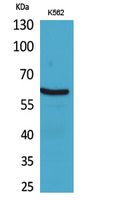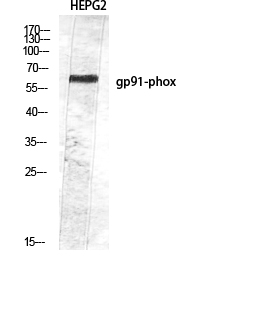gp91-phox Polyclonal Antibody
- Catalog No.:YT5383
- Applications:WB;IHC;IF;ELISA
- Reactivity:Human;Mouse
- Target:
- gp91-phox
- Fields:
- >>HIF-1 signaling pathway;>>Phagosome;>>Ferroptosis;>>Necroptosis;>>Neutrophil extracellular trap formation;>>NOD-like receptor signaling pathway;>>Leukocyte transendothelial migration;>>AGE-RAGE signaling pathway in diabetic complications;>>Alzheimer disease;>>Prion disease;>>Pathways of neurodegeneration - multiple diseases;>>Leishmaniasis;>>Coronavirus disease - COVID-19;>>Diabetic cardiomyopathy;>>Lipid and atherosclerosis
- Gene Name:
- CYBB
- Protein Name:
- Cytochrome b-245 heavy chain
- Human Gene Id:
- 1536
- Human Swiss Prot No:
- P04839
- Mouse Swiss Prot No:
- Q61093
- Immunogen:
- The antiserum was produced against synthesized peptide derived from the Internal region of human CYBB. AA range:111-160
- Specificity:
- gp91-phox Polyclonal Antibody detects endogenous levels of gp91-phox protein.
- Formulation:
- Liquid in PBS containing 50% glycerol, 0.5% BSA and 0.02% sodium azide.
- Source:
- Polyclonal, Rabbit,IgG
- Dilution:
- WB 1:500 - 1:2000. IHC: 1:100-1:300. ELISA: 1:20000.. IF 1:50-200
- Purification:
- The antibody was affinity-purified from rabbit antiserum by affinity-chromatography using epitope-specific immunogen.
- Concentration:
- 1 mg/ml
- Storage Stability:
- -15°C to -25°C/1 year(Do not lower than -25°C)
- Other Name:
- CYBB;NOX2;Cytochrome b-245 heavy chain;CGD91-phox;Cytochrome b(558) subunit beta;Cytochrome b558 subunit beta;Heme-binding membrane glycoprotein gp91phox;NADPH oxidase 2Neutrophil cytochrome b 91 kDa polypeptide;Superoxide-generating NADPH oxidase heavy chain subunit;gp91-1;gp91-phox;p22 phagocyte B-cytochrome
- Observed Band(KD):
- 70kD
- Background:
- Cytochrome b (-245) is composed of cytochrome b alpha (CYBA) and beta (CYBB) chain. It has been proposed as a primary component of the microbicidal oxidase system of phagocytes. CYBB deficiency is one of five described biochemical defects associated with chronic granulomatous disease (CGD). In this disorder, there is decreased activity of phagocyte NADPH oxidase; neutrophils are able to phagocytize bacteria but cannot kill them in the phagocytic vacuoles. The cause of the killing defect is an inability to increase the cell's respiration and consequent failure to deliver activated oxygen into the phagocytic vacuole. [provided by RefSeq, Jul 2008],
- Function:
- cofactor:FAD.,disease:Defects in CYBB are a cause of chronic granulomatous disease X-linked (XCGD) [MIM:306400]. Chronic granulomatous disease is a genetically heterogeneous disorder characterized by the inability of neutrophils and phagocytes to kill microbes that they have ingested. Patients suffer from life-threatening bacterial/fungal infections.,function:Critical component of the membrane-bound oxidase of phagocytes that generates superoxide. It is the terminal component of a respiratory chain that transfers single electrons from cytoplasmic NADPH across the plasma membrane to molecular oxygen on the exterior. Also functions as a voltage-gated proton channel that mediates the H(+) currents of resting phagocytes. It participates in the regulation of cellular pH and is blocked by zinc.,online information:CYBB deficiency database,PTM:Glycosylated.,similarity:Contains 1 FAD-binding FR-t
- Subcellular Location:
- Cell membrane; Multi-pass membrane protein. As unassembled monomer may localize to the endoplasmic reticulum. .
- Expression:
- Detected in neutrophils (at protein level).
- June 19-2018
- WESTERN IMMUNOBLOTTING PROTOCOL
- June 19-2018
- IMMUNOHISTOCHEMISTRY-PARAFFIN PROTOCOL
- June 19-2018
- IMMUNOFLUORESCENCE PROTOCOL
- September 08-2020
- FLOW-CYTOMEYRT-PROTOCOL
- May 20-2022
- Cell-Based ELISA│解您多样本WB检测之困扰
- July 13-2018
- CELL-BASED-ELISA-PROTOCOL-FOR-ACETYL-PROTEIN
- July 13-2018
- CELL-BASED-ELISA-PROTOCOL-FOR-PHOSPHO-PROTEIN
- July 13-2018
- Antibody-FAQs
- Products Images

- Western Blot analysis of K562 cells using gp91-phox Polyclonal Antibody. Antibody was diluted at 1:2000. Secondary antibody(catalog#:RS0002) was diluted at 1:20000

- Western Blot analysis of HEPG2 using gp91-phox Polyclonal Antibody diluted at 1:2000. Secondary antibody(catalog#:RS0002) was diluted at 1:20000

- Western blot analysis of lysate from K562 cells, using CYBB Antibody.



